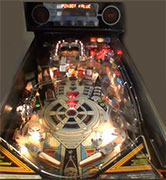
WEDNESDAY, Oct. 10 (HealthDay News) — Grief can be as unpredictable as playing pinball, and reminders of loss can act like pinball rudders and send mourners into a rebound of grief rather than to an exit of acceptance, an expert suggests.
Comparing grieving to pinball can help people in mourning cope and be prepared when other events trigger or prolong their grief, according to Margaret Baier, an assistant professor in the family and consumer sciences division at Baylor University in Houston, who developed the pinball analogy.
A widely accepted model developed in the 1960s outlines five stages of grief: denial, anger, bargaining, depression and acceptance. The process isn’t always sequential but is typically expected to end with acceptance, the theory goes.
And while some people are able to stop grieving after they accept their loss, for others, events such as special dates or a sudden memory can cause a resurgence of grief, according to Baier’s case study of a 24-year-old woman, published in the September issue of Mental Health Practice.
The woman, who she called “Heather,” was at graduate school thousands of miles away from her family when she heard that her father was terminally ill. Heather could not come to terms with the fact that her father, who was relatively young and had seemed healthy, would soon be gone.
Because she was far away from her family, it was easy for Heather to deny her father’s impending death, said Baier, who is also a marriage and family therapist.
Due to her strong religious faith, Heather “bargained” in the form of prayer, believing that she could give up things in her own life in exchange for her father’s health. When her bargaining proved fruitless, she stopped praying and attending church, questioned her religious faith and became angry with people who suggested that her lack of faith was why her father was not getting better.
Although Heather was not clinically depressed, she cried every day and felt hopeless, guilty and fatigued. She thought she would never be happy again and lost interest in eating, working and her studies, Baier explained.
Heather gradually accepted her father’s diagnosis, but she found it very difficult to watch her father prepare for death, suffer through treatments and die, according to Baier.
The pinball machine analogy gave Heather “a sense of relief that she was not crazy” and would one day feel joy again, Baier said in a Baylor news release.
“One of the most freeing aspects of this model is the notion that grief is never complete,” she explained.
As the years passed, a scent, a song or piece of literature sometimes reminded Heather of the pain she felt over losing her father, but “eventually, she returned to acceptance, knowing that grief was resting but not gone,” Baier said.
Baier suggested that the pinball machine model could also be used to help people cope with separation or divorce, job loss and financial problems.
More information
The U.S. National Institutes of Health has more about coping with grief.

